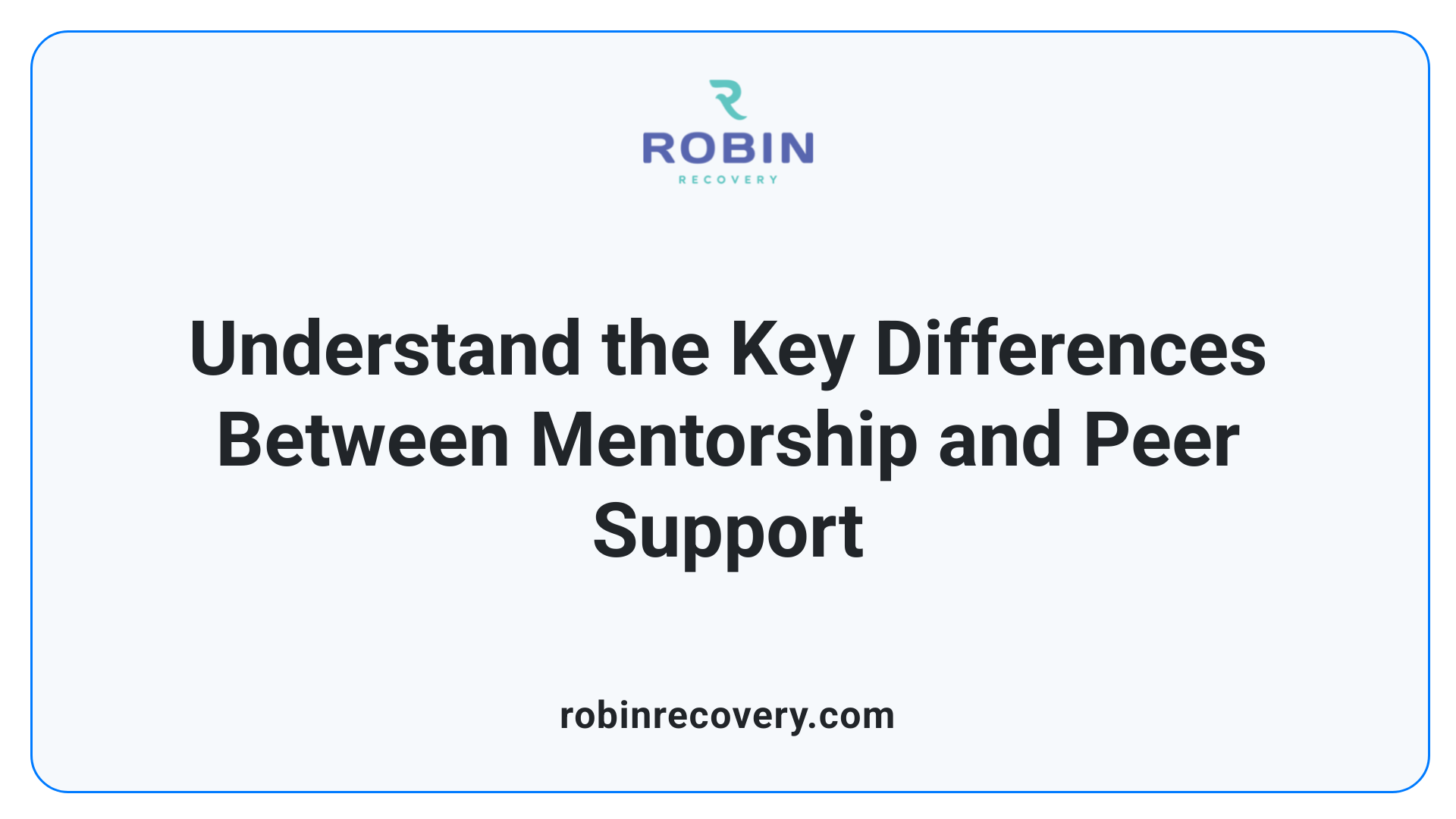The Role of Mentorship in Addiction Recovery

The Vital Role of Mentorship in Recovery
Mentoring serves as a cornerstone in the journey of addiction recovery, offering unparalleled support and guidance for individuals striving to overcome substance use disorders. Through empathetic understanding and shared experiences, mentors—often those who have walked the challenging path of recovery themselves—provide crucial emotional and practical aid. In this article, we delve into the profound impact of mentorship, exploring its benefits, roles, and the invaluable sense of community it fosters.
Understanding the Mentor's Role

What role does a recovery mentor play in supporting an individual's journey?
A recovery mentor plays a crucial role in supporting an individual's journey by helping them develop a personalized recovery plan and set achievable goals. This mentorship is especially impactful because a recovery mentor typically has lived experience with addiction, making them relatable and empathetic towards the challenges faced by those currently navigating their recovery.
Mentors provide ongoing encouragement and motivation, ensuring that individuals stay focused and accountable throughout their recovery process. Regular check-ins create an environment where individuals can openly discuss their struggles and triumphs, fostering trust and establishing a strong support system.
In addition to emotional support, recovery mentors connect individuals with essential resources. These can include support groups, treatment programs, and mental health counseling. Organizations like Green Hill Recovery exemplify this comprehensive support, offering outpatient services and transitional living programs tailored for young adults grappling with addiction and co-occurring mental health issues.
A robust support network is vital, as studies indicate that peer support can increase the chances of maintaining sobriety significantly. Ultimately, recovery mentors contribute to fostering resilience and a sense of community, key components for successful recovery.
The Pillars of Mentorship in Recovery

What are the core pillars of mentorship and how do they apply to addiction recovery?
The core pillars of mentorship include shared interests, personal investment, proactive involvement, skill inculcation, and the ability to inspire others. In the context of addiction recovery, these principles create a nurturing environment conducive to growth and healing. Mentors, often individuals who have successfully navigated their own recovery journeys, embody these pillars as they guide mentees through similar challenges.
- Shared Interests: Mentors often connect with mentees over common goals of sobriety and personal growth, helping to establish trust.
- Investment: A mentor's emotional commitment to their mentee’s journey amplifies motivation and fosters resilience.
- Involvement: Regular check-ins and shared activities keep individuals engaged and accountable.
- Skill Inculcation: Mentoring programs often include training on coping strategies to manage cravings, thereby enhancing recovery skills.
- Inspiration: By sharing their own recovery experiences, mentors provide hope and motivation, demonstrating that lasting change is possible.
Supporting Relationships
Establishing robust support relationships is crucial in addiction recovery. These connections not only alleviate feelings of isolation but also promote a sense of community. As mentors guide mentees through their recovery, they concurrently model healthy behaviors and foster lifelong connections that extend beyond the mentorship experience. This symbiotic relationship enhances both personal accountability and collective growth, thereby reinforcing the mentee's resolve to maintain sobriety.
The Distinction Between Mentorship and Peer Support

Differences in Roles
Peer support and mentorship, while similar, serve distinct purposes in addiction recovery. Peer support involves individuals sharing similar experiences to provide mutual encouragement and understanding. In contrast, mentorship is characterized by a more experienced person guiding a less experienced one, offering direction, advice, and inspiration.
Here’s how they differ:
RolePeer SupportMentorshipNature Reciprocal relationship Unidirectional guidance Experience Shared lived experiences Expertise from a mentor's recovery journey Focus Emotional support and connection Goal-oriented roadmapping
Benefits Comparison
Each has unique benefits that contribute to recovery:
- Peer Support
- Reduces feelings of isolation
- Fosters a sense of community
- Mentorship
- Provides accountability through regular check-ins
- Offers tailored skill-building for navigating recovery hurdles
Combining both strategies creates a strong support network that enhances the chances of long-term sobriety.
Empathy and Shared Experience

Emotional Support
Recovery mentorship programs are built on the foundation of empathy, where mentors often draw from their own experiences with addiction. This emotional support can be crucial during difficult times, as it helps individuals feel understood and validated in their struggles. Mentors offer a listening ear and provide relatable insights, making the recovery journey less isolating. By reflecting on shared challenges and triumphs, mentors inspire hope and resilience in their mentees, reinforcing the idea that recovery is achievable.
Community Building
Beyond personal support, mentorship fosters a sense of community. Individuals involved in peer support feel a stronger connection to others who share similar experiences, reducing feelings of isolation. This communal bond not only offers encouragement but also instills a sense of belonging, which is vital in maintaining long-term sobriety. Programs that emphasize such community connections often see higher success rates, as participants feel more supported and motivated to stay committed to their recovery goals.
In sum, the combination of emotional support and community building through mentorship creates a nurturing environment essential for sustainable recovery.
Peer Mentorship Programs: Structure and Impact
Program Details
Peer mentorship programs in addiction recovery leverage the lived experiences of mentors, often individuals who have successfully navigated their own recovery journeys. These programs aim to provide support, guidance, and a sense of accountability through structured interactions such as regular check-ins. Mentorship fosters emotional support, cultivates community connections, and enhances resilience among those in recovery.
Programs like Mentorship for Addiction Problems (MAP) formalize the peer support framework, pairing early recovery participants with experienced mentors. By integrating mentorship as part of standard treatment, these programs allow individuals to receive tailored skill-building and connections to local resources. Activities like yoga, gardening, and meditation contribute to a holistic recovery experience.
Statistical Outcomes
Research supports the efficacy of peer mentorship in recovery. A pilot study comparing MAP to standard treatment revealed significant differences in substance use days among participants. Early recovery individuals engaging in MAP reported an average of just 4.1 days of substance use within the initial 12 weeks, a substantial improvement over the 16.6 days observed in the treatment-as-usual group.
Moreover, follow-up results indicated sustained benefits, with MAP participants demonstrating only 1.9 days of substance use compared to 5.6 days for those in standard treatment after the initial weeks. These findings underscore the critical role of peer mentorship in enhancing recovery success rates by providing emotional support, fostering accountability, and reducing feelings of isolation.
Accountability and Relapse Prevention
Mentor's Role in Accountability
Mentors play a crucial role in maintaining accountability for individuals on their recovery journey. Regular check-ins with a mentor not only encourage engagement but also foster responsibility for one’s sobriety. This structured support helps individuals stay committed to their goals and navigate the hurdles of recovery more effectively.
Peer mentors, often with their own experiences in recovery, provide tailored advice and emotional support, which can be a vital component in preventing relapse. The bond formed between mentor and mentee creates a safe space for honesty, helping individuals express their challenges openly.
Effects on Relapse Rates
Research indicates that mentorship significantly impacts relapse rates. Studies show that participants in structured mentorship programs report a 45% increase in their likelihood of maintaining sobriety compared to those without such guidance. For example, a pilot study revealed that those in a mentorship program, like the Mentorship for Addiction Problems (MAP), experienced a significant reduction in substance use days—dropping from 16.6 days to 4.1 days within 12 weeks compared to treatment as usual.
This illustrates how the accountability provided by mentors is not just supportive but is also instrumental in enhancing recovery outcomes and fostering long-term sobriety.
Personal Testimonies and Success Stories

Experiences shared
Many individuals in recovery have found that mentorship has played a transformative role in their journey. Mentees often recount how having a mentor who understands their struggles creates a safe space for sharing experiences and fears. The relatability of mentors, who have overcome similar challenges, offers a comforting presence that reinforces the belief that sobriety is achievable.
Inspirational stories
Success stories abound in recovery mentorship programs. One mentee described how regular check-ins with their mentor helped them navigate intense cravings, ultimately leading to sustained sobriety. Another shared that their mentor's personal journey of recovery inspired them to set and achieve their own goals, fostering a sense of hope and purpose.
These stories exemplify the positive impact of mentorship, illustrating how the connection between mentors and mentees can lead to lasting change and promote resilience in recovery. Every account serves as a powerful reminder of the strength found in community and the profound influence of shared experiences.
Mentorship: A Lasting Influence in Recovery
The journey to recovery is fraught with challenges, yet the presence of a dedicated mentor can dramatically enhance an individual's trajectory towards sobriety. By nurturing trust, providing reliable support, and offering lived experiences, mentors not only aid in immediate recovery challenges but also instill long-term resilience and hope. As these relationships thrive, they not only transform individual lives but also cultivate a broader community of healing and support, affirming the undeniable role of mentorship in sustaining recovery.
References
- Mentor: How Mentorship Helps in Recovery
- Mentorship for Addiction Problems (MAP): A New Behavioral ...
- The Benefits of Peer Mentoring Programs in Addiction Recovery
- The Role of Peer Support and Mentorship in Addiction Recovery
- Having a Sober Mentor During Substance Use Recovery
- Mentoring for Preventing and Reducing Substance Use and ...
- The Role Peer Support Plays In Addiction Recovery
